I was trying to solve this exercise from www.spoj.com : FCTRL - Factorial
You don't really have to read it, just do it if you are curious :)
First I implemented it in C++ (here is my solution):
#include <iostream>
using namespace std;
int main() {
unsigned int num_of_inputs;
unsigned int fact_num;
unsigned int num_of_trailing_zeros;
std::ios_base::sync_with_stdio(false); // turn off synchronization with the C library’s stdio buffers (from https://stackoverflow.com/a/22225421/5218277)
cin >> num_of_inputs;
while (num_of_inputs--)
{
cin >> fact_num;
num_of_trailing_zeros = 0;
for (unsigned int fives = 5; fives <= fact_num; fives *= 5)
num_of_trailing_zeros += fact_num/fives;
cout << num_of_trailing_zeros << "\n";
}
return 0;
}
I uploaded it as the solution for g++ 5.1
The result was: Time 0.18 Mem 3.3M

But then I saw some comments which claimed that their time execution was less than 0.1. Since I couldn't think about faster algorithm I tried to implement the same code in C:
#include <stdio.h>
int main() {
unsigned int num_of_inputs;
unsigned int fact_num;
unsigned int num_of_trailing_zeros;
scanf("%d", &num_of_inputs);
while (num_of_inputs--)
{
scanf("%d", &fact_num);
num_of_trailing_zeros = 0;
for (unsigned int fives = 5; fives <= fact_num; fives *= 5)
num_of_trailing_zeros += fact_num/fives;
printf("%d", num_of_trailing_zeros);
printf("%s","\n");
}
return 0;
}
I uploaded it as the solution for gcc 5.1
This time the result was: Time 0.02 Mem 2.1M

Now the code is almost the same, I added std::ios_base::sync_with_stdio(false); to the C++ code as was suggested here to turn off the synchronization with the C library’s stdio buffers. I also split the printf("%d\n", num_of_trailing_zeros); to printf("%d", num_of_trailing_zeros); printf("%s","\n"); to compensate for double call of operator<< in cout << num_of_trailing_zeros << "\n";.
But I still saw x9 better performance and lower memory usage in C vs. C++ code.
Why is that?
EDIT
I fixed unsigned long to unsigned int in the C code. It should have been unsigned int and the results which are shown above are related to the new (unsigned int) version.
